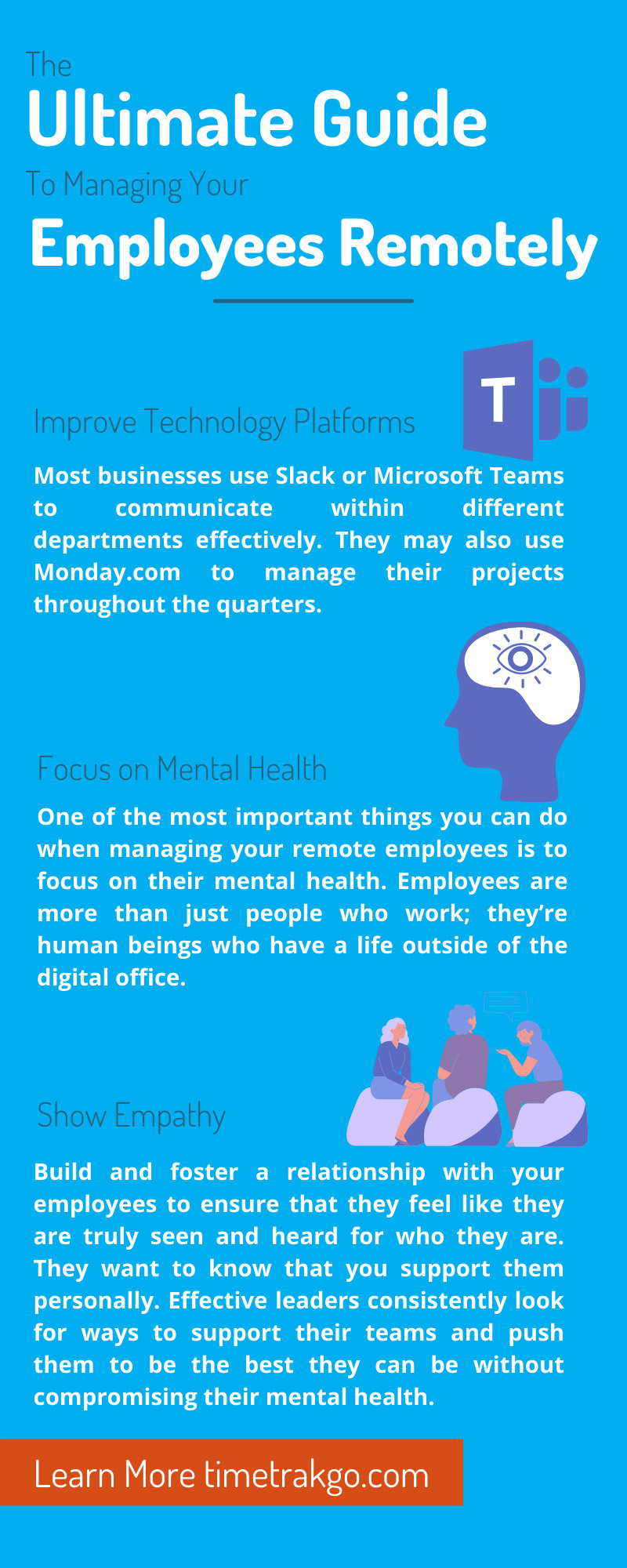While many companies have been working from home since 2020, there are still many of them who are now turning to the remote working lifestyle.
We’ve learned many things throughout the pandemic. One of which is that remote work can benefit a company, but only if a company understands how to manage their employees efficiently.
Whether you’re new to the work-from-home atmosphere or you need a few pointers, here is the ultimate guide to managing your employees remotely.
Improve Technology Platforms
Most businesses use Slack or Microsoft Teams to communicate within different departments effectively. They may also use Monday.com to manage their projects throughout the quarters.
Although these digital platforms can prove helpful for most companies, they might not work for others. Each software brings a set of challenges and benefits, so it’s essential to determine which one is right for your team. For example, Monday.com may work for one company, but your team might be more efficient using Hive or Basecamp. Each program offers many unique features that can be integrated with your systems.
Oftentimes, employees struggle with their workload or team communication because the software they’re using is slow, limited, and outdated.
Remember, your teams communicate and work through these programs, so you must ensure that your programs are up to date, can efficiently manage projects, and that they enable you to streamline the workflow for your employees.
Focus on Mental Health
One of the most important things you can do when managing your remote employees is to focus on their mental health. Employees are more than just people who work; they’re human beings who have a life outside of the digital office.
When you encourage emotional support, you show your employee that you genuinely care about them and their situation. Even asking the simple question, “How are you doing?” can open the door for your employee to express their concerns. The transition to remote work might be stressing them out; talk with them and find a solution that benefits both the employee and the company.
Show Empathy
For years, most workplaces were limited to “work-related conversations” and nothing else. But times are changing. One of the most valuable traits a manager can have in today’s world is empathy.
Build and foster a relationship with your employees to ensure that they feel like they are truly seen and heard for who they are. They want to know that you support them personally. Effective leaders consistently look for ways to support their teams and push them to be the best they can be without compromising their mental health.
Practice Open Communication
Along with showing empathy towards your team, it is vital to practice open communication. If a manager does not practice strong communication skills in the office, remote work will only worsen the issue.
Managing your remote employees is about ensuring that they can communicate with you and the rest of the team.
Open-Door Policy
Open communication may include instilling an “open door” policy, which refers to a manager’s office door remaining open for employees to approach them with feedback, discussion, questions, suggestions, and more.
Translate this policy to the digital workplace by setting regular meetings with the team and one-on-ones with individual employees.
Include Everyone
If your company juggles both in-office employees and remote workers, it’s critical to strike a balance of including both parties.
For example, a small business has 20 in-office and five out-of-state employees. They might be used to working in the office and interacting by having lunch together and brainstorming ideas in person. If in-office workers and remote employees work together on a project, they must work as a team, which starts with you.
If you favor in-office employees over remote employees simply for convenience, you must not show your remote workers how you feel by saying things like:
- “This project would be better if you were here in the office.”
- “We’re keeping this contest in-office because it’s easier that way.”
- “Working with you is hard because you’re remote, which makes my job harder.”
Unfortunately, many managers say these kinds of things to their remote employees. This is a quick way to make them feel inadequate, unappreciated, and eager to seek employment elsewhere.
Value your employees and their work quality instead of their work status.
Keep Them Engaged
When employees worked in your office, they were used to knocking on each other’s doors to have a fun chat during their breaks, but they can’t do that when working from home.
An easy fix includes creating a “water cooler” or “fun” channel in your digital communication platform to keep your employees engaged. You can also choose to create contests to keep the workplace culture alive and thriving.
For example, you might consider a costume contest in October or an “ugly sweater” contest in December. Just because your company is remote doesn’t mean the fun has to stop!
Establish Accountability
As a manager, one of the biggest challenges you face is walking the tightrope of keeping your employees accountable while avoiding micromanaging.
Remote work can make it challenging to check on your employees regarding how they’re progressing through a project or ensuring they “arrived” for work on time. This is where a remote employee time clock comes in handy.
Here at TimeTrakGO, we make it easy for supervisors and small business owners to manage their remote employees by enabling them to track worked hours, time off requests, and PTO balances.
Progress Over Process
During the transition to remote work, many people have had to change how they complete their work. What worked for them in a physical office might not translate to the work-from-home lifestyle.
Many employees might not work a full 9-5 schedule or work consistently due to distractions at home. Be patient with them and give them the space to complete their work on a timely basis. You might consider offering prizes for meeting specific quotas to keep them motivated!
By following this ultimate guide to managing your employees remotely, you naturally improve your skills which can make you a more influential leader. This will ensure that your company and employees are happy, productive, and thriving. Effective leaders are what help the world become a better place.





